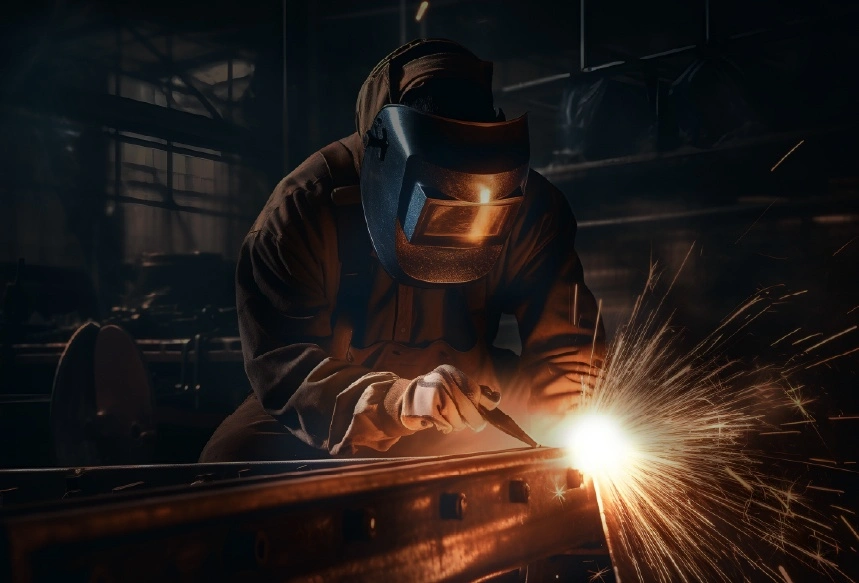RSI is a Great Training Option for Everyone
Learn more about how we can prepare you to advance your career.
The global shipbuilding industry is poised to grow 5 percent through 2032. This demand is driven by the need for energy-efficient vessels, technological advances, and increases in global trade.1 This increase in the shipbuilding industry will directly correlate into a demand for shipyard welders.
What Does a Shipyard Welder Do?
A shipyard welder specializes in welding and fabricating metal structures for the construction, maintenance, and repair of ships, boats, submarines, and other maritime vessels. Their work is important to ensure the structural integrity, functionality, and safety of vessels. They are responsible for welding, fabrication, cutting and preparing metals, and performing welding techniques like arc welding, TIG, MIG and flux-cored arc welding. They also inspect and test welds to make sure they can withstand the pressures of a large ship.
What Skills are Required to Become a Shipyard Welder?
Becoming a shipyard welder requires a combination of technical skills, certifications, physical abilities, safety awareness, and soft skills. Plus, shipyard work demands precision, adaptability, and a strong understanding of welding techniques. Here are some of the important skills required to become a shipyard welder:
Technical Skills
As a shipyard welder, you will need to become proficient in welding techniques taught during the Welding Specialist program at RSI. These welding techniques include:
Shielded Metal Arc Welding (SMAW): Commonly used for heavy-duty welding in shipbuilding and repair.
Get Started on the Path to a New Career
Fill out our form to learn how we can help you change your life.
Flux-Cored Arc Welding (FCAW): Preferred for high-speed and outdoor work in shipyards.
Gas Tungsten Arc Welding (TIG/GTAW): Used for precision welding, especially on thinner or non-ferrous metals like aluminum and stainless steel.
Gas Metal Arc Welding (MIG/GMAW): Ideal for efficiency in assembling large sections of a ship.
Submerged Arc Welding (SAW): Utilized for deep and uniform welds on thick steel plates.
Safety Awareness
Shipyard welders must be familiar with Occupational Safety and Health Administration (OSHA)2 standards and shipyard-specific safety protocols. This includes awareness of hazards such as fire risks, toxic fumes, confined spaces, and working at heights Shipyard welders must use proper Personal Protective Equipment (PPE) that includes:
● Welding helmets with auto-darkening shields.
● Flame-resistant clothing.
● Respirators to protect against fumes.
● Steel-toed boots for working in heavy-duty environments.
Certifications
During the Welding Specialist program at RSI, you will prepare for many essential certifications that will prove your proficiency in shipyard welding. These certifications include:
American Welding Society (AWS) Certifications:
● AWS D1.1 for structural welding.
● AWS D3.5 for underwater welding (if applicable).
Marine-Specific Certifications:
● Certifications for welding ship hulls, pressure vessels, or piping systems.
Safety Certifications:
● Confined Space Entry Certification.
● Hazardous Materials Handling Certification.
Military or Naval Certifications:
● Required for those working on military or government vessels.
Physical Fitness
Shipyard welders need the strength and stamina to handle heavy tools and equipment and to work in physically demanding conditions. They need to be flexible and agile for working in tight spaces, at heights, or in awkward positions for extended periods.
Soft Skills
In addition to technical expertise, shipyard welders require soft skills to excel in their roles. These skills help them effectively communicate, adapt to challenging environments, and meet the high standards of the shipbuilding industry. The important soft skills include:
Communication Skills
Shipyard welders must be able to clearly communicate with supervisors, engineers, and teammates about project requirements, progress, and potential issues. They must be able to understand and follow verbal and written instructions, such as blueprints or safety protocols. Plus, they need to share feedback to improve team workflows or address challenges.
Problem-Solving Skills
Shipyard welders must identify and resolve welding issues, such as material defects or equipment malfunctions, to maintain project timelines. They must also think critically to adapt techniques or materials when unexpected challenges arise.
Time Management
Shipyard welders must prioritize tasks and work efficiently to meet deadlines, especially during high-demand periods like ship overhauls or tight project schedules. They must also balance multiple responsibilities without compromising quality.
Adaptability
A shipyard welder must adjust to changing project needs, based on weather conditions or work environments. For example, they may need to transition from outdoor welding to confined spaces during severe weather conditions. They must also learn new techniques or tools to stay current with industry advancements.
Attention to Detail
Shipyard welders must ensure precision and accuracy in every weld to maintain structural integrity and safety. They must also carefully inspect completed work for defects or inconsistencies that could compromise quality.
Initiative and Willingness to Learn
Shipyard welders must seek out opportunities to improve skills and gain new certifications. They should take the initiative to solve problems, assist teammates, or go beyond minimum requirements.
Final Thoughts on Shipyard Welding
The role of a shipyard welder requires a unique combination of technical expertise, physical ability, and dedication to safety. By mastering these skills, you can build a successful career in the shipbuilding industry. Take the first step toward becoming a shipyard welder and learn more about the Welding Specialist program at RSI.
Want To Learn More?
The welding certification path starts with enrolling in RSI’s Welding Specialist program. We offer hands-on training with classroom lectures to prepare you for entry-level structural, alloy, and pipeline welding job opportunities. To learn more, contact us.
1) https://hrforecast.com/the-future-of-the-shipbuilding-industry/
2) https://www.osha.gov/sites/default/files/publications/OSHA_shipyard_industry.pdf




